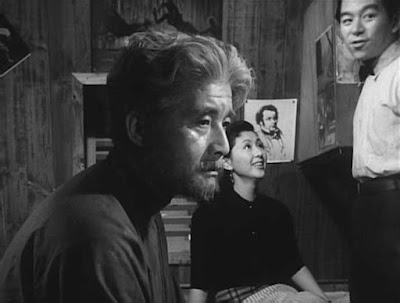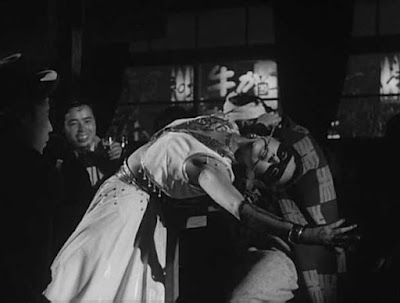Twilight Saloon
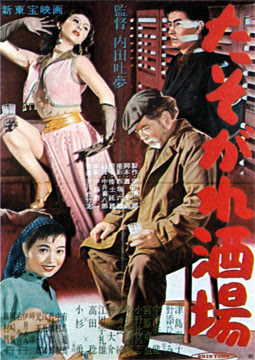
Director: Tomu Uchida
Year: 1955
Rating: 9.0
Aka - Tasogare Sakaba
If it had been another night, there would
have been other dramas playing out, other stories to tell, different characters
in the camera's eye but this is how it was on this night. Director Tomu Uchida
pulls together multiple story lines in one night in one location. The Twilight
Saloon. A restaurant and bar with live entertainment that attracts a cross-section
of Japan economically, professionally and backgrounds. Even a few Yakuza.
He is in a sense telling us the story of post-war Japan still finding its
way. Those who have given up hope and those who who have it and are pushing
Japan to the future. Those that feel the guilt and a younger generation that
ten years after the war has moved on. Uchida had been working in Manchuria
for the Manchuko Film Association when he was taken prisoner in 1945. He
didn't return to Japan till 1954 and directed Bloody Spear at Mount Fuji,
his first film in 14 years. He followed that with this film that sums up
how he now was seeing Japan. Broken by its past but changing quickly, modernizing
but still with a hold on tradition.
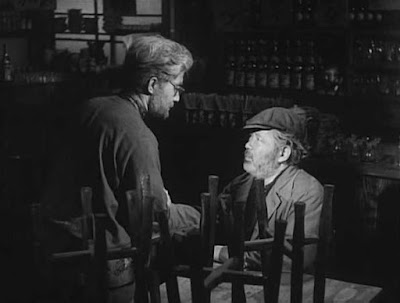
It is a marvelously humane film with a
myriad of characters and as the night goes on they take a hold on you. You
begin to feel that you are there witnessing all this - a part of their lives
- a fly on the wall. Many of the dramas are short and unfinished - customers
who come in - show themselves and then leave. Omitsu, a middle aged woman
sitting with her husband suddenly stands up and yells at him "Have a nice
life. You're only my husband because you're paying me monthly" and leaves.
He follows her only to be reminded by a waitress that he has to pay his bill.
He does so and quickly descends the stairs - neither to be seen again. How
will that end you wonder. The patrons all go back to their drinks.
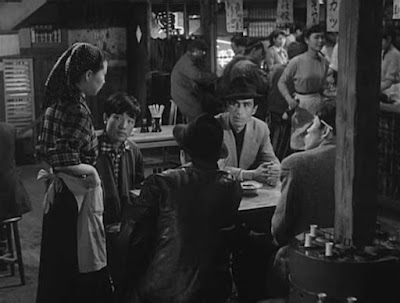
In a slightly larger vignette an elderly
gentleman looking like the world is crushing him sits down and orders an
egg-rice bowl. One of the other customers recognizes him and comes over and
says Col. Onitsuka, don't you remember me. It's Kibe. I served under you.
The old colonel brightens up, they talk about the war, his bravado but in
the end he says now I am only a real estate agent and yells at all the non-martial
music being played. Leftists parade below singing which infuriates him and
Kibe. Eventually, he too pays up and leaves - not to be seen again. You probably
can guess how that will end. These small glimpses into the lives of the patrons
continue but it is a few members of the staff and Mr. Umeda who take up most
of it.
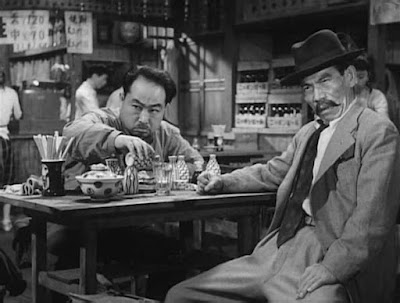
The entire film takes place in the saloon
over one night. It begins with all the female workers coming in from their
staff dormitory and they efficiently and pleasantly get the place ready to
open - everyone knowing their job. The customers start to walk in - each
met with a hearty group welcome and seated. Their order is yelled by the
waitress to the kitchen. Sitting at the end of the bar is the grizzled Mr.
Umeda (Isamu Kosugi), a fixture in the bar who is the first in and the last
to leave, slowly drinking and handing out wisdom, charity and gossip. This
is his Cheers. As the night evolves he becomes the moral center of this small
universe. At a certain hour the entertainment begins and music permeates
the film from then on. Most of it is provided by Kenichi (Takuya Miyahara)
singing everything from opera to Korean folk music and Mr. Eto on the piano.
Sometimes one of the waitresses Yuki (Hitomi Nozoe) sings a few ballads.
Occasionally the customers break into song. The radio plays a Hibari Misora
song. Much later in the night Emmy (Keiko Tsushima) comes in for her striptease.
They all have backstories that brought them here. That keep them here. This
night their lives are at turning points.
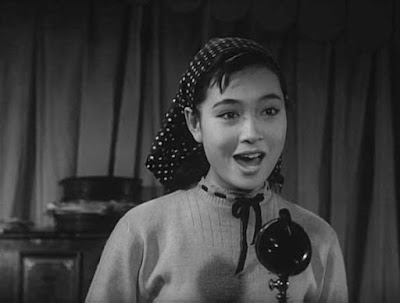
It is beautifully shot in black and white
and Uchida uses the camera to great effect as it moves around the room often
in great tracking shots, up to the stage and into the dressing rooms - catching
bits and pieces of dialogue and lives. The scene in which Emmy does her dance
is remarkable as she moves around the room, flower stem between her teeth,
Zorro mask on, the faces of the men alight in anticipation - she flirts and
slowly dances - then sees a man in the corner who frightens her - he gets
up moves towards her with a knife - the audience thinks he is part of the
act as she moves back. I am so glad I came across this film and decided to
watch it simply because I liked the title. It is the sort of film that can
easily slip by, but shouldn't. Uchida of course was to go on to major success
with his Miyamoto Musashi series on the famous Samurai. This is a quiet gem.






